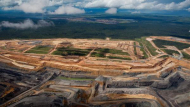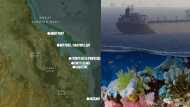Report triggers campaign to prevent Australian fossil fuel investment
For more information and comment, contact:
Annemarie Johnson, Head of Communications, Sunrise Project
Phone +61 (0)428 278 880
Email annemarie@sunriseproject.org.au
Skype annemarie.jonson
Julien Vincent, Market Forces
Phone +61 (0)419 179 529
Skype julien-vincent
Email: julien@marketforces.org.au
For more information and comment, contact:
Annemarie Johnson, Head of Communications, Sunrise Project
Phone +61 (0)428 278 880
Email annemarie@sunriseproject.org.au
Skype annemarie.jonson
Julien Vincent, Market Forces
Phone +61 (0)419 179 529
Skype julien-vincent
Email: julien@marketforces.org.au
A new report, Financing Reef
Destruction: How Banks are using our Money to Destroy a Natural Icon, by
Market Forces and 350.org, makes clear that the ‘big four’ Australian
banks – ANZ, Commonwealth, NAB and Westpac – play a critical role in
enabling major fossil fuel projects in the Great Barrier Reef World Heritage Area. Combined, these banks lent $3.8
billion to coal ports and LNG terminals in the Great Barrier Reef Word
Heritage Area since January 2008.
The report also shows a clear
trend of growing foreign investment, with institutions from China, India
and the United States all lending multi-billion sums to fossil fuel
projects in Australia. The single-biggest loan was an AU$2.8 billion US
Export-Import Bank facility for the Australia Pacific LNG plant on
Curtis Island in the Great Barrier Reef Wold Heritage Area. That loan
has landed the Bank in court over an alleged breach of the US Endangered
Species Act.
A series of new coal and gas export projects,
including mines, overland transport and export terminals are planned
that would increase fossil fuel exports along Great Barrier Reef
coastline. Companies including GVK and Adani (India), Samsung (Korea)
and the China National Offshore Oil Corporation are attempting to open
up access to coal and gas reserves in Australia.
“The big banks
are using the money of Australians who care about protecting the Great
Barrier Reef to finance its destruction,” said Julien Vincent, Market
Forces Lead Campaigner. “This is absolutely unacceptable, and as key
decision-makers over new dirty coal and gas projects that would damage
the Reef and drive global warming, the banks have to show leadership and
refuse loans to these projects.”
350.org co-founder and author
Bill McKibben, coming to Australia in June for a “Global Warming: Do the
Maths” tour, said “We've got to wind down the fossil fuel era with
great haste if we're going to keep the planet from overheating. This
report by Market Forces provides Australians with the information they
need to make hard decisions about where their money is invested and if
it's helping or destroying the planet."
The declining state of
the Great Barrier Reef is making fossil fuel export projects more
contested in Australia. Opposition to fossil fuel projects in the Great
Barrier Reef escalated this week, with a series of television
advertisements telling Queenslanders that they are going to have to
fight for the Reef. After visiting the Reef in March 2012, UNESCO
recommended a halt to coastal development that would impact the site’s
Outstanding Universal Value and that the Reef be considered for
inscription on the World Heritage In Danger list.
Recent reports
have also highlighted the gulf between fossil fuel development and the
amount of carbon that the atmosphere can hold if global temperatures are
to have a chance at staying below 2˚C. A report by CarbonTracker
recently found that $674 billion was spent in 2012 developing carbon
assets that may be unburnable if the world takes appropriate action to
limit carbon emissions1.
“When you do the maths on avoiding the
worst impacts of climate change, there simply isn’t enough room in the
carbon budget for new fossil fuel projects,” said McKibben. “If new coal
and gas projects amount to an exercise in digging up unburnable carbon,
that makes the loans that enable these projects a massive economic
gamble.”
Market Forces and 350.org are calling on customers of
the big four banks to ask questions about what their money is being used
for and ultimately to decide if they want to keep their money at
institutions who are financing reef destruction and global warming.
“It’s
time for Australian bank customers to consider an ultimatum: either the
banks rule out future loans to coal and gas mining and export projects
in Australia by the end of the year, or the customers close their
accounts and take their money elsewhere,” Vincent said.
“We hope
customers taking action stimulates a positive reaction from the banks –
if they won’t make the right decision for moral reasons maybe they’ll do
it to preserve their own customer base”, said Vincent.
The report, Financing Reef Destruction, is available on this page.
1. Carbon Tracker’s research can be found on this page.


